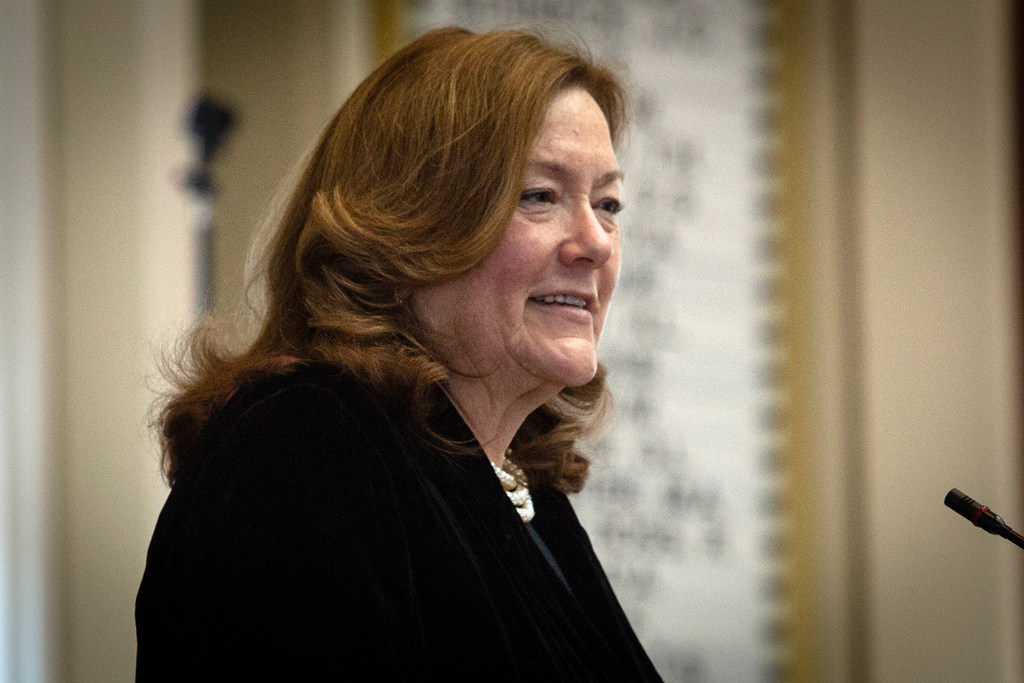
The chief justice of the Maine Supreme Judicial Court urged lawmakers Tuesday to fund a comprehensive approach to combating the state’s opioid crisis, even though that funding wouldn’t necessarily flow to the judicial branch that she oversees.
During her annual address to a joint session of the Maine Legislature, Chief Justice Leigh Saufley said Maine courts won’t be able to expand programs it has to help people struggling to overcome addiction without an investment in the services that happen outside the courts.
“All of the funding necessary to respond to the addiction and mental health needs of the public should be focused on the wide range of necessary community-based services that are not within the judicial branch budget,” Saufley said.
The state’s courts run a number of specialty courts — including the drug, veterans and mental health courts — out of courthouses around the state often as an alternative to jail sentences. They depend on connecting participants with services provided in their local communities.
Saufley told lawma
— Immediate access to mental health, addiction recovery, medical and dental care
— Safe and sober housing
— Data collection and analysis
— Case managers, coaches, mentors
— Testing equipment and laboratories that are not backlogged
— Job training and education opportunities
“The bottom line is this,” Saufley said. “The judicial branch has a protocol in place that allows the creation of new addiction and mental health dockets as soon as the key components are in place in your communities, and you need not focus that funding on the judicial branch.”
“I applaud Chief Justice Saufley’s commitment to ensuring that justice is fairly and effectively administered in Maine — a commitment I shared as Attorney General and continue to share as Governor. It is the goal of my Administration to work collaboratively and supportively with the Judiciary wherever possible and to partner, particularly on critical issues like the opioid epidemic, where the branches of government can work together to improve the lives of Maine people. Specifically, I look forward to working with the Judiciary to evaluate and expand community supports for drug courts and other specialty courts.”
Rep. Barbara Cardone, D-Bangor, said there was nothing surprising in Saufley’s speech. The attorney, who practices family law, said that she agreed with the chief justice about the need for community services to support people in specialty courts.
“The key to making the specialty courts work is to have services outside the courtroom so people can get what they talk about inside courtroom to improve their lives,” Cardone, who is a member of the Judiciary Committee, said.
Cardone said she did not know how expensive the kinds of services the chief justice suggested would be or if lawmakers would be willing to fund them this legislative session given that the governor does not want to raise taxes.
“The state needs a lot of services after eight years of rollback under the previous administration,” she said. “We’ll have to see where our priorities are and where the money is.”
Saufley focused her speech on three areas — upgrading equipment to allow for more use of technology to access the court system, the implementation of digital case management and e-filing in the court system, and changes to how criminal and juvenile cases are handled.
In order to expand access to the legal system, she said, the court system’s website is undergoing a complete revision to include forms and instructional booklets in multiple languages, helpful videos for use by unrepresented litigants as well as lawyers and the public, and quick access to information and to other sites that may be helpful.
The $10 million transition from an entirely paper system to an electronic case filing system is to be implemented in late 2020 with a pilot project in Penobscot and Piscataquis counties, but not all information will be accessible by the public. Criminal cases, traffic infractions and most civil cases will be available online but adoption records, child protection records, mental health civil commitment records and most juvenile records will not.
“We estimate that those cases comprise more than 85 percent of the court’s annual case filings,” Saufley said. “Some kinds of information will not be available to the public in any digital files, such as Social Security numbers, bank account numbers, or personal medical records.”
A decision about domestic violence and family cases is pending.
“In domestic violence cases, we must all comply with the federal law that shields any information identifying a petitioner from any internet availability. We will have more on this soon,” she said. “In family cases, we are designing a hybrid rule that will allow public access to the nature of the proceedings and summaries of the resulting judicial actions but will not provide public access to the very personal filings between and among the parties, many of which relate to the struggles that children experience during periods of family instability.”
A decision about whether access to documents will be free for everyone or if it will be a subscription service similar to that offered by the federal court system has not been made, Saufley said at a press conference after her speech.
Saufley also urged the Legislature to fund program to help juveniles in crisis who wind up in the court system.
“Our children and youth in crisis need more mental health services and recovery facilities designed for youth,” she said. “They need: Safe housing and youth-focused facilities, where they can receive treatment and be protected from predators; resources to extract them from human trafficking and keep them from harm and well-trained advocates to help them navigate our complex social services and legal systems.”
She said that the largest gap in juvenile services is the absence of options for placement of young people who cannot go home.
“We all understand that, if the only option for placement in Maine is Long Creek [the state’s youth prison], which is designed for very specific circumstances, we are not doing justice for our children,” she said.
Several bills are pending calling for the closure of the state’s only juvenile jail.
Saufley spoke broadly about the work the judiciary is doing and did not specifically ask for funding for particular bills.
Gov. Janet Mills, the former attorney general, attended the session. Her predecessor, Paul LePage, did not attend all of Saufley’s addresses.
This article originally appeared on www.bangordailynews.com.




